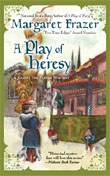CHAPTER 4
Since there was no peace to be had in the players’ upper chamber once several women gathered to their sewing there with Rose, Joliffe spent the next morning cramped into a corner of the players’ cart with the scroll of the Nativity (it being called that for simplicity’s sake) play entrusted to him by Basset. Before seeing what might be done with the Messenger, he made a quick read through the whole play, this being Basset’s copy and so all of it. Everyone else in the play would have only his own part and whatever line from someone else’s speech cued each of his own speeches. That saved on ink and paper but could make confusion over what happened when and with whom until everyone became familiar with whatever play they were doing…
There were, upon a time, far more medieval English plays than now exist, and even some of what we have are only fragments, but from what remains, we can build an idea of the richness there must have been.
Probably best known among the survivors are the “cycle plays”, written to be performed in procession on specially-made “pageant wagons” through the streets of cities and towns prosperous enough to afford the extravaganza. The most complete sets of plays that can be associated with their towns are those from York and Chester. Others that are known to have existed have disappeared completely or only partially remain, as with Coventry’s, where we have two plays surviving and no more, despite evidence showing there were a number of others.
But there were a number of other kinds of plays to be had in medieval England, and some of those we still have, too: Single-episode biblical dramas; knockabout farces; “action dramas” with Robin Hood and St. George; the exquisite Everyman; the brutal (but fragmentary) Dux Moraud ; and, far from least, large-scale productions like The Castle of Perseverance, Wisdom, and Mankind that require a large playing place, numerous cast, elaborate sets, and special effects. Unhappily, they’re only a pittance of what there must once have been, giving tantalizing suggestions of things we’ll never have a chance to see (which makes taking the chance to see modern productions of what survives all the more precious).
To my own ends, when Joliffe appeared in The Bastard’s Tale, I had chance to use both Wisdom and an actual farce from the time, and in A Play of Heresy I use Coventry’s surviving two for the plays Joliffe and his company are most involved with. With all these plays, as I “produced, directed, and acted” them while writing the stories, I came to appreciate more and more fully just how theatrically effective they are. In other of Joliffe’s books, most of the plays that Basset’s company have done have been of my own imagining because few small plays, such as would work for a small traveling company, have survived. But I’m ambitious for Basset’s company: There are still some splendid plays that I very much want to see them do and a number of medieval theatrical experiences I want to explore – with murder and intrigue along the way, of course.
– Margaret
Follow the virtual bookclub for A Play of Heresy on Facebook and Twitter.
















